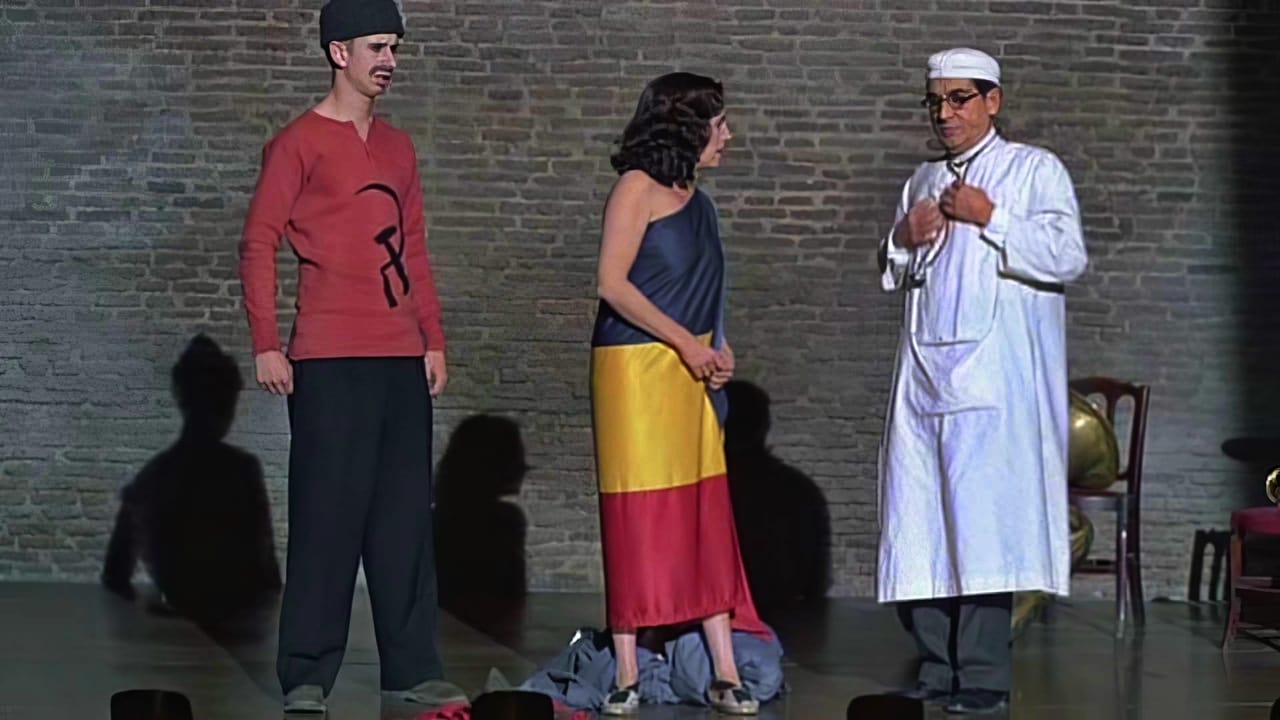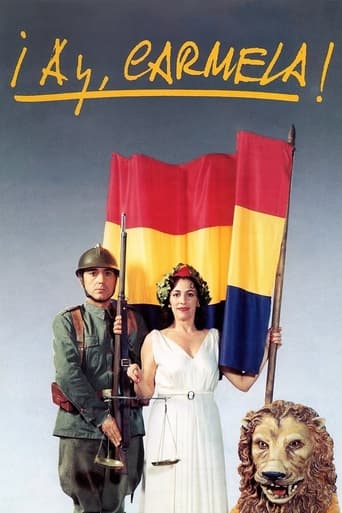Sexylocher
Masterful Movie
Tedfoldol
everything you have heard about this movie is true.
Bea Swanson
This film is so real. It treats its characters with so much care and sensitivity.
Deanna
There are moments in this movie where the great movie it could've been peek out... They're fleeting, here, but they're worth savoring, and they happen often enough to make it worth your while.
sequoia-13873
Carlos Saura is one of the most famous directors in Spain and has won countless awards. Ay, Carmela! was his 23rd film and was nominated for 13 Goya Awards when it came out in 1990. The movie is set during the Spanish Civil War. The main characters are Carmela and Paulino, a couple, and their sidekick, Gustavete, who is a mute. These three are a team of performers who put on shows for the Republican forces. During these shows, Carmela sings the song "Ay, Carmela" which was an important symbol during the times of the Civil War for the Republican forces. Carmela performs original songs as well, and each one is accompanied by a dance number, which usually play up her womanly figure and inherent sexuality. As the trio moves on towards Valencia, they get caught in a Nationalist territory and are easy targets for arrest due to their Republican flag, which is a prop from their performances. As they begin to be transported, to what they think is going to be their death, they meet an Italian lieutenant who just happens to be a fan of the theatrical arts. Due to his interest in their performances, he asks that they perform for his Nationalist troops. Paulino must quickly rewrite their scripts and songs to make it suit the other side. Polish troops that have been held captive are forced to watch the mockery of their ideals. Carmela, a dedicated Republican, is very reluctant to perform for the enemy, and struggles with the transition. In the end, she ends up shot dead by one of the Nationalist troops for her obvious love of the Republican movement. Her death causes Gustavete to get his voice back, as he screams in anguish of her death. This movie was crucial to the time that it was made because it was far enough after the Civil War that Carlos Saura, and his viewers, were finally able to find humor in the Civil War. The War brought with it many deaths, destruction, and a division of the country. The war ended with the victory of the Nationalists, which resulted in the rule of Francisco Franco for the next 36 years. Ay, Carmela was the first movie mentioning the Civil War that portrayed it in a comedic sense. The world of film was blessed when Carlos Saura decided that he could finally treat the War with humor. My only problem with the film is the way in which Carmela was portrayed. I feel that she was displayed solely as an object of sexual desire, when realistically she was extremely patriotic and was passionate about her admiration for the Republic. I think that Saura touched on this side of her, but I found that the ratio of sexuality to intellect was a little skewed for my taste. I really enjoyed watching this movie, as I found it applicable to what I know about the Spanish Civil War. I appreciate Saura's ability as a director to find humor in something that was so painful for his country, and that he was able to share it with the nation, allowing them to finally find the comedic relief that was hidden within the war. After watching this movie, I would only recommend it to those that are familiar with the contexts of Spain in the 1930s. Those of Spanish heritage, or those who have learned about it in a college course, are bound to enjoy it, due its comedic representation of something that had such a negative impact on the country of Spain. The lighthearted, upbeat, and musical tones that this film takes are truly a work of art. Though, due to the types of jokes in this film, all of which deal with the history of the Spanish Civil War, I do not think that anyone unfamiliar with the War would find much humor in it.
Armand
it is a form of parable. piece of long exorcism of Spain against its past shadows. a film like a puzzle of references. art resistance, moral choices, adventure, burlesque, compromises and truth, love and life and dream. all under the precise art of Carlos Saura tools. part of a chain, it is different. not only for extraordinary performance of Carmen Maura but for courage to not be only a Spanish story. the three flags, the prisoners, the school, theater, maybe the map are clues for define a deep European crisis and confrontation with the past. and that is the essence of this splendid movie - to open doors, to transform a past story in present reflection, to be a testimony and, in same measure, an invitation to discover the best choice in dark periods.
v-tadic
I was only able to watch this beautiful movie recently, since the English subtitles appeared on the Internet. Pity it took someone so long to translate it. The film deals with the eternal dilemma of artists, torn apart between the urge to survive and to upheld some moral standards, in civil wars or during the enemy occupation. Under the skillful direction of Carlos Saura, all the actors performed superbly. The music is authentic and contemporary and sounds very convincing. After too many wars, the artist that entertained the enemy were often judged overly harshly. Not everybody is made to be a hero, and hunger is a very potent stimulant. The film is absolutely a must, but not for Fascist lovers, of course.
congaqueen19
I think "Ay, Carmela" has a lot to offer in the way of understanding better the history of Spain and more specifically the Spanish Civil War. True, the characters are a bit underdeveloped, but not so much that one doesn't "care what happens:" The tension of the situation in Spain is clearly felt in the theater as Paulino and Carmela perform, and although we don't really get to know any of the characters very deeply, you can't help but feel the power of the tragedy as Carmela lies on the stage dying amidst the chaos. Furthermore, there is a lot of symbolism that a viewer would not get without having some knowledge of the Civil War and Franco's dictatorship, such as Carmela being buried -*outside*- of the cemetery in the middle of nowhere.

